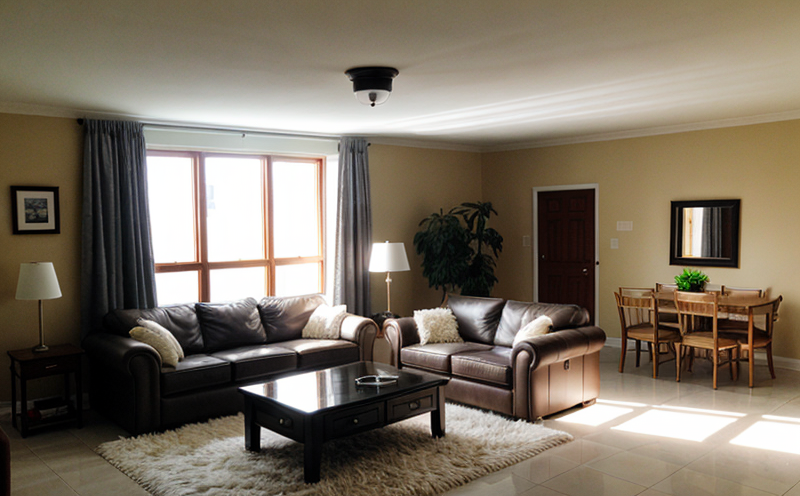IEC 62031 Indoor Lighting Safety Testing of LED Modules
The International Electrotechnical Commission (IEC) standard IEC 62031 addresses the safety and performance requirements for lighting equipment, including LED modules used in indoor applications. This comprehensive testing protocol ensures that the lighting systems meet global safety standards, thereby protecting users from risks such as fire hazards, electric shocks, and other potential dangers.
The standard covers a range of tests designed to evaluate various aspects of the LED module's performance under different conditions. These include thermal analysis, electrical performance checks, electromagnetic compatibility (EMC) testing, and more. The focus is on ensuring that the modules not only function correctly but also pose no risk to human health or property.
Thermal management is a critical aspect of IEC 62031 compliance due to the high heat dissipation capabilities of LED modules. Proper thermal analysis ensures that the module can operate within safe temperature limits, preventing overheating and potential fire hazards. Electrical performance checks are equally important, as they ensure that the module operates correctly with minimal energy consumption.
EMC testing is another crucial component of this standard. It evaluates the ability of LED modules to function properly in an electromagnetic environment without causing interference or being affected by external electromagnetic signals. This ensures reliable operation in both residential and commercial settings.
The IEC 62031 protocol also includes specific tests for luminaires, which are integral components of indoor lighting systems. These tests ensure that the luminaire can withstand various environmental conditions while maintaining its safety features. The standard's comprehensive approach helps manufacturers produce high-quality LED modules that meet global safety standards.
For compliance officers and quality managers, understanding these testing protocols is essential for ensuring product safety and regulatory compliance. By adhering to IEC 62031, manufacturers can demonstrate their commitment to producing safe and reliable indoor lighting solutions.
R&D engineers benefit from this standard by having a clear roadmap for developing new LED modules that meet global safety standards. The detailed specifications provided in the standard allow them to design products that are both innovative and compliant with international regulations.
Procurement personnel can leverage IEC 62031 to select suppliers who adhere to these stringent testing protocols. By ensuring that their suppliers comply with this standard, procurement teams can guarantee the quality and safety of the LED modules they source for use in their indoor lighting systems.
Industry Applications
The IEC 62031 standard is widely applicable across various sectors where indoor lighting plays a crucial role. Key applications include:
- Residential Lighting: Ensuring that residential LED modules meet safety and performance standards, enhancing user safety.
- Commercial Buildings: Providing reliable lighting solutions for offices, retail spaces, and other commercial environments.
- Hospitality Industry: Guaranteeing the safety of LED modules used in hotels, restaurants, and other hospitality venues.
- Education Sector: Ensuring that educational institutions have safe and efficient indoor lighting systems.
- Data Centers: Meeting stringent safety requirements for LED modules used in data centers to support high-performance computing environments.
The standard is particularly important in these sectors because it helps maintain a balance between energy efficiency, cost-effectiveness, and user safety. By adhering to IEC 62031, manufacturers can provide products that meet the diverse needs of various industries while ensuring compliance with international regulations.
International Acceptance and Recognition
- European Union (EU): The EU is one of the key regions where IEC 62031 is widely accepted. Compliance with this standard ensures that indoor LED lighting products meet European safety regulations.
- Australia and New Zealand: The standards used in these countries are closely aligned with those prescribed by IEC, making compliance with IEC 62031 a priority for manufacturers operating in the region.
- United States of America (USA): While not mandatory, many U.S. states and municipalities encourage or require compliance with international standards like IEC 62031 to ensure product safety.
- China: The Chinese government has adopted several international standards, including IEC 62031, for the regulation of LED lighting products.
The widespread acceptance and recognition of IEC 62031 across these regions underscore its importance in the global market. Compliance with this standard not only ensures product safety but also facilitates easier export and import processes between different countries.
By adhering to IEC 62031, manufacturers can access a broader market while ensuring that their products meet stringent safety standards. This makes compliance an essential part of the manufacturing process for LED lighting modules used in indoor applications.
Use Cases and Application Examples
The IEC 62031 standard has numerous practical applications, particularly in the design and production of safe and reliable LED modules for various indoor lighting environments. Here are some specific use cases:
- Office Lighting: Ensuring that office LED modules provide a safe and comfortable working environment by meeting stringent safety standards.
- Hospital Rooms: Guaranteeing the safety of LED modules used in hospital rooms, where even minor electrical hazards could have serious consequences.
- School Classrooms: Providing safe lighting for educational environments to enhance learning while ensuring user safety.
- Warehouse Lighting: Ensuring that warehouse LED modules are robust enough to withstand the rigors of industrial settings.
- Theaters and Arenas: Guaranteeing that the lighting in theaters and arenas meets safety standards to ensure a secure environment for both performers and spectators.
- Smart Home Devices: Ensuring that smart home LED modules are safe and reliable, integrating seamlessly with other smart home devices.
- Healthcare Facilities: Providing safe lighting solutions for healthcare facilities where patient safety is paramount.
The wide range of applications demonstrates the versatility and importance of IEC 62031 in ensuring that LED modules used in indoor lighting environments meet global safety standards. Compliance with this standard helps manufacturers produce products that are not only innovative but also safe for use in diverse settings.





